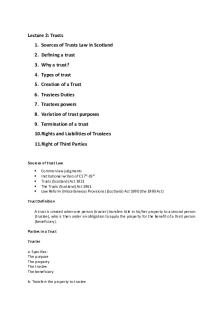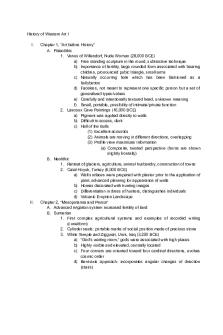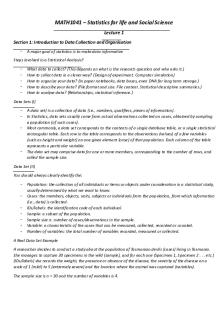Coriolanus Notes PDF

| Title | Coriolanus Notes |
|---|---|
| Author | Rahul Savadia |
| Course | English Literature |
| Institution | The Chancellor, Masters, and Scholars of the University of Cambridge |
| Pages | 6 |
| File Size | 129.9 KB |
| File Type | |
| Total Downloads | 78 |
| Total Views | 133 |
Summary
Summary notes on Shakespeare's Coriolanus as a piece of tragic drama, with comparison to The Dead by James Joyce...
Description
Coriolanus Notes 1.i First Citizen Before we proceed any further, hear me speak. All Speak, speak. First Citizen You are all resolved rather to die than to famish? All Resolved. resolved. First Citizen First, you know Caius Marcius is chief enemy to the people. All We know't, we know't. First Citizen Let us kill him, and we'll have corn at our own price. Is't a verdict? All No more talking on't; let it be done: away, away! CORIOLANUS: The people are a ‘musty superfluity’, signals his one-dimensionality, he does later say he would rather be a ‘sword’ MENENIUS There was a time when all the body's members Rebell'd against the belly, thus accused it: That only like a gulf it did remain I' the midst o' the body, idle and unactive, Still cupboarding the viand, never bearing Like labour with the rest, where the other instruments Did see and hear, devise, instruct, walk, feel, And, mutually participate, did minister Unto the appetite and affection common Of the whole body. The belly answer'd-… Sir, I shall tell you. With a kind of smile, Which ne'er came from the lungs, but even thus-For, look you, I may make the belly smile As well as speak--it tauntingly replied To the discontented members, the mutinous parts That envied his receipt; even so most fitly As you malign our senators for that They are not such as you. 1.iii VOLUMNIA I sprang not more in joy at first hearing he was a man-child
than now in first seeing he had proved himself a man. VIRGILIA But had he died in the business, madam; how then? VOLUMNIA Then his good report should have been my son; I therein would have found issue … VOLUMNIA Away, you fool! it more becomes a man Than gilt his trophy: the breasts of Hecuba, When she did suckle Hector, look'd not lovelier Than Hector's forehead when it spit forth blood At Grecian sword, contemning II.ii -
The honorific gesture towards the returning soldier, an integral part of the Greek polis, is rejected by Coriolanus
CORIOLANUS I had rather have one scratch my head i' the sun When the alarum were struck than idly sit To hear my nothings monster'd. Exit -
‘monster’d’ still has the resonance of demonstration and warning, from the Latin monere, in the context of the senate he is being demonstrated as an example of a virtue, his actions, his ‘nothings’ are being interpreted, reified into meaning, this is what he is resisting, and for him this act is ‘idle’
COMINIUS I shall lack voice: the deeds of Coriolanus Should not be utter'd feebly. It is held That valour is the chiefest virtue, and Most dignifies the haver: if it be, The man I speak of cannot in the world Be singly counterpoised. -
Significantly, he leaves for this, he is not present, here it is literally his ‘nothing’ being ‘monster’d’,
-
To be a ‘monster’ is to be intolerable, unbearable to the polis, and ultimately Coriolanus is a monster
II.iii Third Citizen
We have power in ourselves to do it, but it is a power that we have no power to do; for if he show us his wounds and tell us his deeds, we are to put our tongues into those wounds and speak for them; so, if he tell us his noble deeds, we must also tell him our noble acceptance of them. Ingratitude is monstrous, and for the multitude to be ingrateful, were to make a monster of the multitude: of the which we being members, should bring ourselves to be monstrous members. – for Coriolanus to be ‘monster’d’ is to be alienated from one’s own will, but in the context of the polis to be ‘monstrous’ is to act in a way morally alien to the polis – this sort of intersubjectivity is what alarms Coriolanus, it is emblematic of the returned soldier, and turns the act of rhetoricising acts, of III.i CORIOLANUS: I would they were barbarians – as they are,/ Though in Rome litter’d – not Romans – as they are not SICINIUS: Coriolanus ‘would depopulate the city and/ Be every man himself’ – Coriolanus is the antithesis of the vision of classical democracy we receive from Eumenides, Coriolanus may be a soldier, but the principle of agon is one which fosters contestability, it foregrounds the importance of dialectical development of ideas and skills in the court, on stage – Coriolanus has left when he says this, another instance of him being offstage for a key moment of report, he is not es meson, he does not place himself in the mix when he is not willing CORIOLANUS Mine own desert. Second Citizen Your own desert! CORIOLANUS Ay, but not mine own desire. Third Citizen How not your own desire? MENENIUS His nature is too noble for the world. He would not flatter Neptune for his trident Or Jove for's power to thunder. His hearts his mouth. What his breast forges, that his tongue must vent, And, being angry, does forget that ever He heard the name of death. (3.1.255-60 V.iii CORIOLANUS I'll never Be such a gosling to obey instinct, but stand,
As if a man were author of himself And knew no other kin. but a hundred lines later says ‘mother, mother’ – man cannot ‘author…himself’ V.vi CORIOLANUS Cut me to pieces, Volsces; men and lads, Stain all your edges on me. Boy! false hound! If you have writ your annals true, 'tis there, That, like an eagle in a dove-cote, I Flutter'd your Volscians in Corioli: Alone I did it. Boy! AUFIDIUS My rage is gone; And I am struck with sorrow. Take him up. Help, three o' the chiefest soldiers; I'll be one. Beat thou the drum, that it speak mournfully: Trail your steel pikes. Though in this city he Hath widow'd and unchilded many a one, Which to this hour bewail the injury, Yet he shall have a noble memory. – once again his ‘nothings’ are ‘monster’d’
Criticism -
Langis: The idea of the ‘golden mean’ of acting moderately, drawn from Nicomachean Ethics, was a behavioural influence in early modern England, a “powerful cultural commonplace”, regularly invoked though not often with detailed explanation of how to apply it
-
Shakespeare can be seen exploring the tragic hero’s moderation in Macbeth, where the eponymous hero protests ‘who dares do more is none’
-
Langis describes the golden mean as a “situational virtue”, a term which already implies contingency and moderation – if you believe that situational ethics is a meaningful phrase then you already believe one must act according to the occasion, which perhaps brings Kairos and to prepon into the mix
-
Aristotle illustrates moderation as a skilled archer hitting a target – the point being that moderation is not just self-negation, but self-mastery with the emphasis on mastery
-
Langis argues that Coriolanus has a “lack of virtuous moderation” and tht this “reflects the collective immoderation of the entire polity: the state’s inability to bring its various parts into salutary corporate balance”
-
Goldman argues that Coriolanus has a “lack of inwardness” – is this the focal point for his tragedy, is his interiority demonstrably different from Hamlet’s? Perhaps he is just hesitant
-
-
Aristotle Poetics: emphasis on universality rather than specificity as what distinguishes poetry from history, and what gives poetry its value, can this be held as an Attic value?
-
Langis says Coriolanus has a “hypervirtue”, an interesting take on the idea of hamartia
-
Roman virtus is where virility and virtue come from, important etymological foundation for Coriolanus’ character
-
Langis Marketplace as “Coriolanus’ public trial”, the devolution of the courtroom into the sphere of the mass
-
Arete – moral virtue
-
Langis argues Coriolanus “firmly subscribes to the dominant political conception of antiquity, the Platonic tripartie state hierarchically composed of rulers, soldiers and workers/commoners corresponding respectively to the reason, passions and appetites of the tripartite soul” – it is certainly true that Coriolanus disdains appetite, but in Greece soldiers were citizens, professionalism was not quite what it is today
-
Langis – “Moderation, requisite for the rational discussion and often collective decision making in civic society, is antithetical to the heroic ideal of exceeding the crowd”
-
Schodel: “Commonplace wisdom…held that both monarch and subject should use moderation to preserve the constitutional balance of the royal prerogative and subjects’ liberty…a vague but normative mean between the extremes of tyranny and anarchy”
-
Sophrosyne – Greek idea of temperance, “moderation, self-knowledge, and self restraint” – North in the Dictionary of the History of Ideas describes how the polis meant that these virtues became more important
Shakespeare and Republicanism – Hadfield -
“Republicanism was a fund of stories and potent images – the rape of Lucrece, the civil war between Julius Caesar and Pompey the Great, the assassination of Caesar”
-
Essentially Hadfield seems to argue that, since Republicanism was in an “inchoate” form, a slow gathering of ideas and images, we should pay attention to these images
-
Late 16th century republicanism was committed to maintaining as a constitutional right that the reigning monarch be subject to the advice of reasonable consuls – perhaps we see in Coriolanus the idea of the man who cannot be counselled, it is not the king but a figure of excess and brilliance
Jacobean Politics – Zeeveld -
- Rise of Parliament men, wht the Elizabethans called “popular determination”, was on the rise as James acceded, posing a “serious challenge to the royal prerogative”
-
MP Christopher Yelveton made a remark in Parliament about the limits of princely prerogative
-
James was more intransigent than Elizabeth, who was diplomatic enough to yield every now and then
-
The public followed the debates, people were interested in parliamentary debate
-
The difference between Coriolanus and Eumenides is that the latter is more symbolic in its depiction of the assemblage of parts, in Coriolanus we see the actual citizens, Eumenides dramatises the idea of debate
-
1614 ‘Parliament business is the greatest entertainment that we have’ – there was an understanding of parliament debate as theatre
-
Eumenides: ‘with a magic spell – with words – we will devise the master-stroke’ – the term here us ‘mythos’, perhaps there is a sense of narrative, we will tell a story...
Similar Free PDFs
Popular Institutions
- Tinajero National High School - Annex
- Politeknik Caltex Riau
- Yokohama City University
- SGT University
- University of Al-Qadisiyah
- Divine Word College of Vigan
- Techniek College Rotterdam
- Universidade de Santiago
- Universiti Teknologi MARA Cawangan Johor Kampus Pasir Gudang
- Poltekkes Kemenkes Yogyakarta
- Baguio City National High School
- Colegio san marcos
- preparatoria uno
- Centro de Bachillerato Tecnológico Industrial y de Servicios No. 107
- Dalian Maritime University
- Quang Trung Secondary School
- Colegio Tecnológico en Informática
- Corporación Regional de Educación Superior
- Grupo CEDVA
- Dar Al Uloom University
- Centro de Estudios Preuniversitarios de la Universidad Nacional de Ingeniería
- 上智大学
- Aakash International School, Nuna Majara
- San Felipe Neri Catholic School
- Kang Chiao International School - New Taipei City
- Misamis Occidental National High School
- Institución Educativa Escuela Normal Juan Ladrilleros
- Kolehiyo ng Pantukan
- Batanes State College
- Instituto Continental
- Sekolah Menengah Kejuruan Kesehatan Kaltara (Tarakan)
- Colegio de La Inmaculada Concepcion - Cebu















